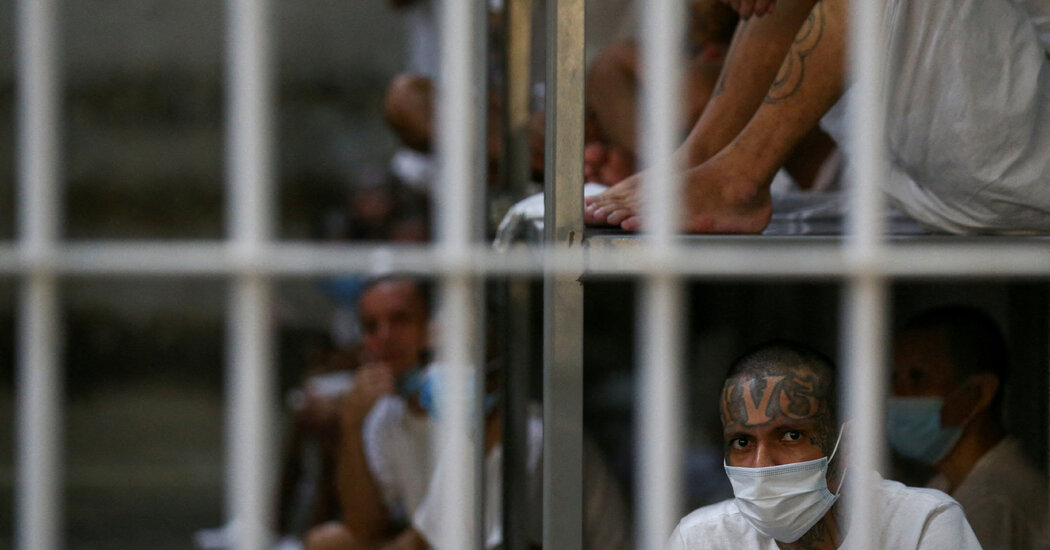It takes at least two countries to make a deportation happen: one to send deportees and one to receive them. Typically, the receiving country agrees to take back its own citizens, but the Trump administration is developing other options.
The U.S. has sent hundreds of deportees, most of whom appear to be Venezuelans, to El Salvador, where they are being held in a maximum-security prison notorious for its brutality. The U.S. has sent migrants from Asia, the Middle East and Africa to Panama and Costa Rica, including families with young children.
The Trump administration is also in early talks with the Rwandan government to send deportees to the central African country, and this month the U.S. made plans to send Laotian, Vietnamese and Filipino migrants to Libya before backing down in the face of a court order. (Representatives of Libya’s warring governments have since denied making any agreement to accept deportees from the United States.)
The expansion of the administration’s third-country deportation program appears to have two aims in the service of its overarching goal to remove millions of immigrants from the United States, including both undocumented immigrants and those who have legal status but are viewed as undesirable by the administration.
The first seems largely tactical: It creates a process to remove migrants whose countries of origin don’t want them back. Venezuela, for example, only sporadically accepts deportation flights from the United States.
The second aim, it appears, is strategic: Convince immigrants, documented or otherwise, that staying in the United States is so risky that they should “self-deport,” lest they end up in a brutal prison. It’s a campaign designed for deterrence.
Zooming out, there is another way to look at these deportations: By setting up third-country deportation agreements and claiming they are shielded from judicial review or oversight, the administration is trying to create an outsourced global detention system where rights to due process effectively do not exist, one run by mostly authoritarian governments that are trying to curry favor with President Trump.
Mr. Trump and his allies have portrayed the administration’s deportation policies as necessary for national security. He has cast doubt on the right to due process, which is guaranteed in the U.S. Constitution for citizens and noncitizens alike, if it impedes his mass deportation campaign.
Harsh treatment in third countries
Rwanda and Libya have spent years positioning themselves as solutions to wealthier nations’ immigration problems.
In 2022, Rwanda agreed to take asylum seekers from Britain in exchange for hundreds of millions of pounds. Between 2014 and 2017, it accepted thousands of Eritrean and Sudanese asylum seekers from Israel. Libya, too, has obtained considerable aid and other concessions from European countries in exchange for helping to prevent migrants from reaching European soil.
But those plans have not gone smoothly because there is a mountain of evidence showing that Rwanda and Libya are not safe destinations for asylum seekers or other migrants. U.S. law prohibits deporting people to countries where they are likely to face persecution or torture.
Britain’s Rwanda plan collapsed after a court found that it violated international humanitarian law, which prohibits sending refugees to countries where they would face persecution. Rwanda has a record of persecuting political opponents at home and abroad, and its courts had rejected all asylum claims from people fleeing conflict zones, the court noted.
The British court also found that refugees sent to Rwanda were at risk of being deported again to other countries where their safety could likewise not be ensured. The Israeli Supreme Court halted deportations to Rwanda after reaching a similar conclusion in 2018.
Libya’s extreme abuses of migrants have also been well documented. In a 2021 report, Amnesty International called the country’s migrant detention centers a “hellscape” where adult and child prisoners were subjected to sexual violence and other forms of abuse. And in February this year, two mass graves containing at least 93 bodies of migrants were found in Libya, prompting calls for the European Union to freeze migration funding for the nation’s security forces.
For the Trump administration, the harsh treatment of detainees may be more of a feature than a bug.
El Salvador has boasted in flashy videos about the humiliating and dehumanizing conditions in which it holds prisoners. Kristi Noem, the U.S. homeland security secretary, who visited El Salvador’s massive Terrorism Confinement Center, known as CECOT, last month, made a similar point:
The legal abyss
Dual-state theory describes a type of authoritarianism in which a government maintains an apparently normal legal system while creating a zone where people have no real rights and can be subjected to unconstrained violence and coercion. Aziz Huq, a law professor at the University of Chicago, described this as a “legal abyss.”
The worst suffering befalls those who fall into that abyss, but it affects everyone living under such a system. A government that can push people into the abyss is fundamentally unconstrained. And the threat of being pushed into the abyss can make freedoms uncertain and conditional.
In most dual states, the legal abyss is run by the government itself, within its own territory. But El Salvador, itself a dual state, seems to have offered its legal abyss to the United States on a contract basis, imprisoning deportees in CECOT, a notorious prison where people are held in brutal conditions, cut off from all contact with the outside world and with few prospects of release.
The Trump administration has argued that U.S. courts have no jurisdiction over those deportations or the rights of the deportees sent to El Salvador.
The situation in Rwanda is less clear. If U.S. deportees were treated similarly to those from Israel and Britain, then they would not be imprisoned or detained. But the Israeli and British high court decisions show that there is reason to believe that their rights might be violated in other ways and that they would have little access to due process if the government did imprison them at the behest of the Trump administration.
And Libya seems especially likely to become another subcontracted legal abyss if it does become a destination for U.S. deportees. Libya is a weak and war-torn state, not a dual one, where a United Nations-recognized government in Tripoli rules western Libya and another in Benghazi, led by the warlord Khalifa Haftar, controls the east.
For years, Libya has maintained a network of detention centers where migrants have no recourse to due process, and there is no functional limits on the violence to which the detainees, including children, are subjected. Human rights groups have called the conditions “horrific” and “deplorable,” and they worry that if the United States sends people there, the detainees will have no rights and no means of escape.
Thank you for being a subscriber
Read past editions of the newsletter here.
If you’re enjoying what you’re reading, please consider recommending it to others. They can sign up here. Browse all of our subscriber-only newsletters here.
I’d love your feedback on this newsletter. Please email thoughts and suggestions to interpreter@nytimes.com. You can also follow me on Twitter.


